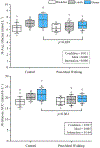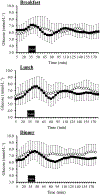Post-meal exercise under ecological conditions improves post-prandial glucose levels but not 24-hour glucose control
- PMID: 38858835
- PMCID: PMC11240283
- DOI: 10.1080/02640414.2024.2363688
Post-meal exercise under ecological conditions improves post-prandial glucose levels but not 24-hour glucose control
Abstract
We investigated whether post-meal walking (PMW) improved post-prandial glucose and 24h glucose control under free-living conditions among physically inactive young women.
Methods: Young women (Age: 20±1years; percent body fat: 28.2 ± 12%; BMI: 23.8 ± 4.2kg·m-1) completed a randomised crossover study to assess if PMW confers benefit. On the PMW day, women completed three bouts of brisk walks, and on the Control day they were instructed to follow normal habitual activities. Continuous glucose monitors captured post-prandial and 24h glucose, and physical activity monitors tracked physical activity throughout the study.
Results: PMW walking increased total daily step count (Control = 9,159 ± 2,962 steps vs. PMW = 14,611±3,891 steps, p<0.001) and activity scores (Control=33.87±1.16 METs·h vs. PMW = 36.11±1.58 METs·h, p < 0.001). PMW led to lower 3h average post-prandial glucose (main effect of condition, p=0.011) and 3h post-prandial area under curve glucose responses (main effect of condition, p = 0.027) compared to the control condition. Post hoc analysis revealed the largest decline occurred after dinner (3h average glucose Control = 7.55±1.21 mmol/L vs. PMW = 6.71 ± 0.80mmol/L, p = 0.039), when insulin sensitivity is typically diminished. Despite improvements in post-prandial glucose control, this did not translate to improvements in 24h glucose control (p > 0.05).
Conclusion: Physically inactive and metabolically healthy young women, PMW improves post-prandial glucose but not 24h glucose control.
Keywords: Glucose control; continuous glucose monitoring; post meal walking.
Conflict of interest statement
CONFLICTS OF INTEREST
The authors report no conflict of interest. The study results are presented clearly and honestly without fabrication, falsification, or inappropriate data manipulation.
Figures


References
-
- Little JP, Jung ME, Wright AE, Wright W, Manders RJF. Effects of high-intensity interval exercise versus continuous moderate-intensity exercise on postprandial glycemic control assessed by continuous glucose monitoring in obese adults. Appl Physiol Nutr Metab. 2014;39(7):835–841. doi:10.1139/apnm-2013-0512 - DOI - PubMed
Publication types
MeSH terms
Substances
Grants and funding
LinkOut - more resources
Full Text Sources
Medical
